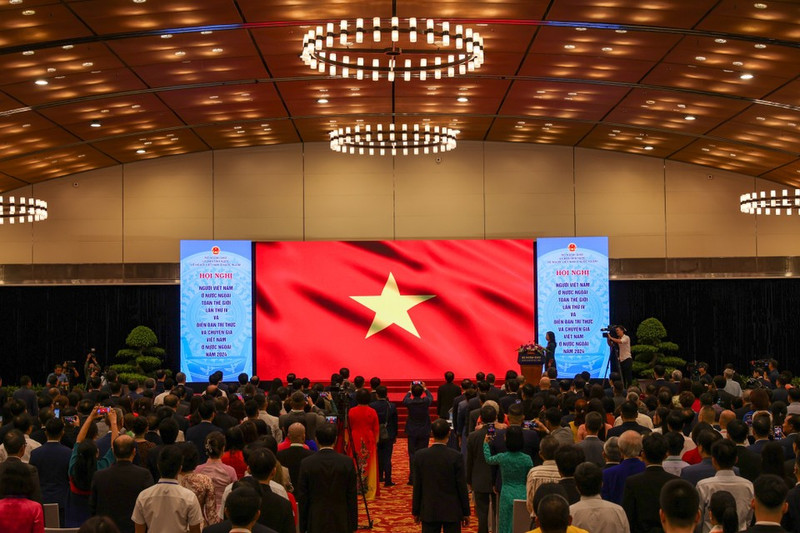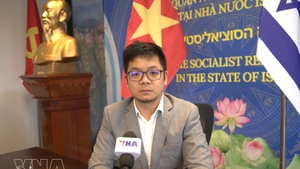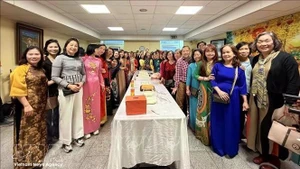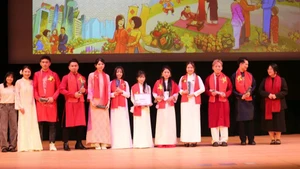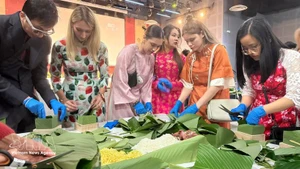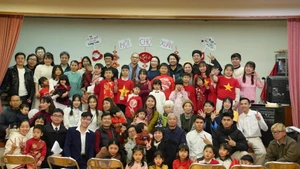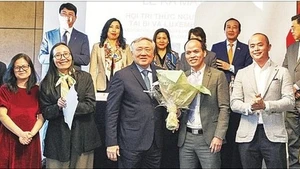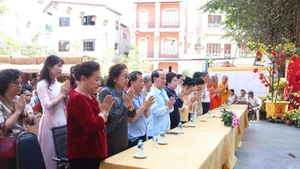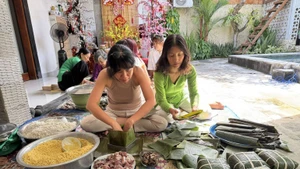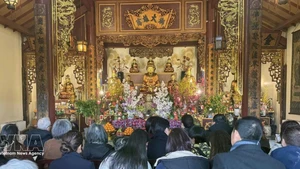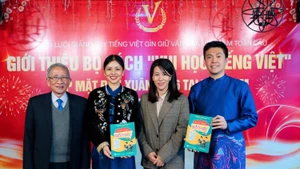From the perspective of those living and working in developed countries, the OVs’ contributions not only concretise the Party’s policy to leverage the OVs resource, but also suggest many practical solutions linking global Vietnamese intellect with the country’s development.
Connecting intelligence and spreading culture – The soft power of the global Vietnamese community
As principal of a Japanese language school in Fukuoka, Japan, Nguyen Duy Anh believes the key to successfully implementing Politburo Resolution No. 71-NQ/TW dated August 22 2025 on breakthroughs in education and training is to develop a consistent and effective connection among domestic educational institutions, research institutes, enterprises, and the network of overseas Vietnamese intellectuals and students.
He suggested that Viet Nam needs to establish a national platform for data and high-quality human resources, which gathers information on experts, scientists, businesspeople, and overseas Vietnamese students worldwide; helping domestic schools, institutes, and businesses proactively find research partners and advisors, thereby forming "two-way knowledge transfer" cooperation chains.
Moreover, Viet Nam should vigorously promote academic exchanges, internships, and short-term research programmes between domestic, and international educational institutions, especially in countries with large number of OVs, such as Japan, the Republic of Korea (RoK), the US, Australia, Germany, and Canada.

“Once the State creates favourable legal frameworks and appropriate incentives, the intellectual capital of the global Vietnamese will become one of the key drivers accelerating the rapid, sustainable development of education, science, and technology domestically,” emphasised Duy Anh.
Besides education, preserving and spreading the cultural identity of Vietnamese communities overseas is a strategic task, directly contributing to building a well-rounded Vietnamese person, as outlined in the draft documents of the 14th Party Congress.
For overseas Vietnamese, culture is not only a spiritual value but also the foundation of identity and national pride, a strong bond between generations.
Duy Anh asserts that teaching Vietnamese, organising traditional festivals, cultural, artistic, and gastronomic exchange programmes, or introducing Vietnamese culture into schools abroad should be regularly maintained with financial, and policy support from the homeland.
As long as Vietnamese is spoken within families, and Vietnamese culture is respected internationally, national identity remains vibrant, strengthening the bond between overseas Vietnamese and their homeland.
Highlighting the establishment of the global network for Vietnamese language teaching, which now connects more than 30 countries, as a vivid example of “preserving the Vietnamese language and safeguarding the national soul” motto, Duy Anh stresses that as long as Vietnamese is spoken within families, and Vietnamese culture is respected internationally, national identity remains vibrant, strengthening the bond between overseas Vietnamese and their homeland, and this also represents an effective form of public diplomacy spreading a compassionate, civilised, and modern image of Viet Nam.
Referring to the younger generation of overseas Vietnamese, which is regarded as the future bridge between Viet Nam and the world, Duy Anh emphasises their dual advantage: educated in modern international environments while deeply imbued with Vietnamese cultural and spiritual values.
To leverage this advantage, Viet Nam needs to expand practical exchange programmes, study-abroad semesters in the homeland, community volunteering, start-up summer camps, applied research, and digital initiatives connecting Vietnamese youth globally.
Duy Anh notes that many young Vietnamese descendants in Japan, after participating in education, technology, and volunteer projects in Viet Nam, have become “young ambassadors” spreading a positive, dynamic, and deeply integrated image of Viet Nam.
He believes, “This is how the nation’s aspiration to rise is passed down through generations who are proud of their roots while proactively contributing to the country’s future.”
Strengthening trust and promoting national solidarity

From Germany, Pham Khanh Nam, Editor-in-Chief of Huong Viet Magazine, emphasised that in the context of deep globalisation, more than six million Vietnamese overseas — among them over 200,000 in Germany alone — are becoming a strategic resource for the country.
According to him, this represents a vast soft power that, if organised, connected, and harnessed effectively, will make a significant contribution to foreign affairs, public diplomacy, technology transfer, and the development of the knowledge economy.
Nam proposed that Viet Nam build a flexible coordination mechanism between diplomatic agencies and overseas Vietnamese associations to effectively implement cultural exchange, education, investment promotion, trade, and science-technology programmes; simultaneously develop a network of “People’s Ambassadors” within the global Vietnamese community, so that every Vietnamese abroad becomes a reliable bridge and close friend of Viet Nam on the international stage.
A digital platform connecting Vietnamese youth globally should also be built to promote internships, exchanges, and research in Viet Nam so overseas Vietnamese youth better understand their homeland, nurturing national pride and a spirit of dedication.
He also highly regarded the draft documents for the 14th National Party Congress identifying science and technology, innovation, and digital transformation as central drivers of rapid and sustainable development, noting this is also a field where overseas Vietnamese intellectuals and entrepreneurs have outstanding strengths.
He recommended establishing a regular connection mechanism between the overseas Vietnamese intellectual network and ministries, sectors, and localities in Viet Nam to share experiences, advise on policy, cooperate in research, training, and technology transfer.
Furthermore, there is a need to establish an Overseas Vietnamese Startup Innovation Support Fund, which will create favourable procedures, intellectual property protection, green technology transfers, clean energy, and encourage the “overseas intellectuals returning under short-term projects” model — a flexible approach that maximises global intellectual resources while accommodating international experts' working conditions.
In culture and education, Nam stressed promoting Vietnamese language teaching and learning abroad as a long-term cultural-educational mission. He cited the Vietnamese language classes in Frankfurt, actively supported by the Vietnamese Consulate General, as a vivid example of effective State-community collaboration that should be replicated in countries with large Vietnamese populations.
Additionally, he proposed developing a system of Viet Nam Houses abroad — community centres for cultural exchange, legal consultation, vocational guidance, study abroad support, and youth entrepreneurship — to create spaces fostering connection and spreading Vietnamese values.
A digital platform connecting Vietnamese youth globally should also be built to promote internships, exchanges, and research in Viet Nam so overseas Vietnamese youth better understand their homeland, nurturing national pride and a spirit of dedication.
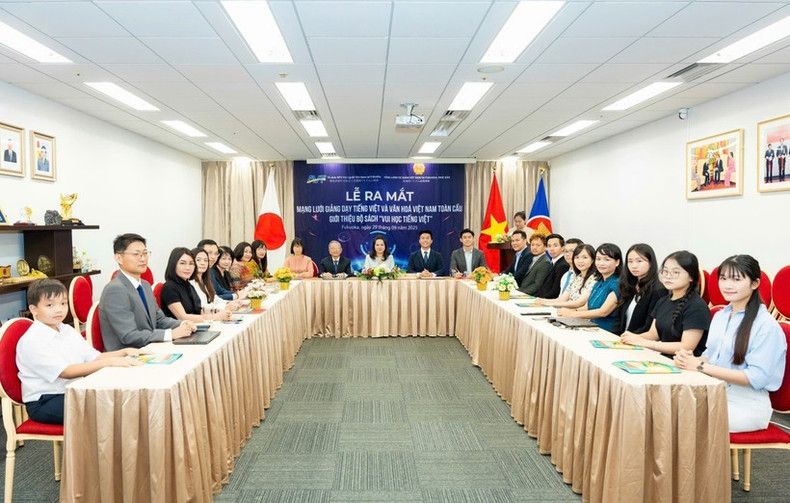
Regarding consolidating national solidarity, Nam believes the most crucial thing is maintaining trust, respect, and two-way connection between domestic and overseas Vietnamese. There should be regular dialogue mechanisms between domestic leaders and overseas Vietnamese, not only during festivals but also in professional forums, so the voices of intellectuals, entrepreneurs, and expatriates are heard, valued, and promptly responded to.
Alongside this, Viet Nam should continue simplifying administrative procedures, recognising qualifications, facilitating overseas Vietnamese repatriation, investment, and participation in national development projects; regarding overseas Vietnamese affairs as a strategic component in building national solidarity, part of the nation’s soft power and an early, distant defence foundation.
While contributing to the draft documents of the 14th National Party Congress, both Nguyen Duy Anh and Pham Khanh Nam shared a common view that the overseas Vietnamese community is an inseparable part of the nation, an important intellectual, spiritual, and cultural resource in the Viet Nam’s prosperity, happiness, and development.
Their heartfelt opinions not only express their deep attachment to the homeland but stand as proof of the vigorous vitality of the global Vietnamese spirit always oriented towards the fatherland, jointly building a prosperous, civilised, and happy Viet Nam.
